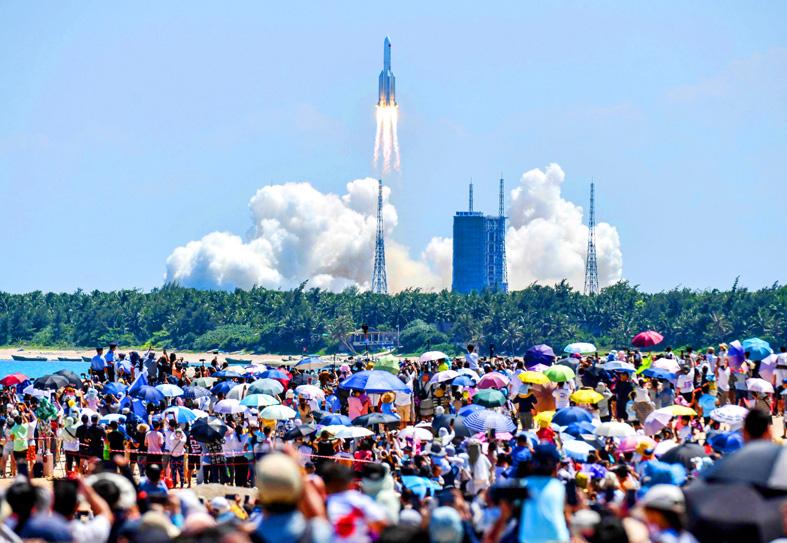A Chinese booster rocket on Saturday made an uncontrolled return to Earth, leading US officials to chide Beijing for not sharing information about the potentially hazardous object’s descent.
US Space Command “can confirm the People’s Republic of China (PRC) Long March 5B (CZ-5B) re-entered over the Indian Ocean at approx 10:45 am MDT on 7/30,” the US military unit wrote on Twitter.
“We refer you to the #PRC for further details on the reentry’s technical aspects such as potential debris dispersal+ impact location,” it added.

Photo: AFP
In a statement posted to WeChat, the China Manned Space Agency later gave coordinates for an impact area in the Sulu Sea, about 57km off the Philippines’ Palawan Island.
“Most of its devices were ablated and destroyed during re-entry,” the agency said of the booster rocket, which was used on July 24 to launch the second of three modules China needed to complete its new Tiangong space station.
The Malaysian National Space Agency said it detected rocket debris burning up on re-entry before falling in the Sulu Sea northeast of the island of Borneo.
“The debris of the rocket caught fire while entering the Earth’s airspace and the movement of the burning debris also crossed Malaysian airspace and could be detected in several areas including crossing the airspace around the state of Sarawak,” it said.
Social media users in Malaysia posted video of what appeared to be rocket debris.
NASA Administrator Bill Nelson said that Beijing’s failure to share details of the rocket’s descent was irresponsible and risky.
“All spacefaring nations should follow established best practices, and do their part to share this type of information in advance, to allow reliable predictions of potential debris impact risk, especially for heavy-lift vehicles, like the Long March 5B, which carry a significant risk of loss of life and property,” he wrote on Twitter.
“Doing so is critical to the responsible use of space and to ensure the safety of people here on Earth,” he added.
Aerospace Corp, a US-funded nonprofit research center near Los Angeles, said it was reckless to allow the rocket’s entire main-core stage — which weighs about 22 tonnes — to return to Earth in an uncontrolled re-entry.
Additional reporting by Reuters

Auckland rang in 2026 with a downtown fireworks display launched from New Zealand’s tallest structure, Sky Tower, making it the first major city to greet the new year at a celebration dampened by rain, while crowds in Taipei braved the elements to watch Taipei 101’s display. South Pacific countries are the first to bid farewell to 2025. Clocks struck midnight in Auckland, with a population of 1.7 million, 18 hours before the famous ball was to drop in New York’s Times Square. The five-minute display involved 3,500 fireworks launched from the 240m Sky Tower. Smaller community events were canceled across New Zealand’s

The Ministry of Foreign Affairs (MOFA) yesterday said it is closely monitoring developments in Venezuela, and would continue to cooperate with democratic allies and work together for regional and global security, stability, and prosperity. The remarks came after the US on Saturday launched a series of airstrikes in Venezuela and kidnapped Venezuelan President Nicolas Maduro, who was later flown to New York along with his wife. The pair face US charges related to drug trafficking and alleged cooperation with gangs designated as terrorist organizations. Maduro has denied the allegations. The ministry said that it is closely monitoring the political and economic situation

UNRELENTING: China attempted cyberattacks on Taiwan’s critical infrastructure 2.63 million times per day last year, up from 1.23 million in 2023, the NSB said China’s cyberarmy has long engaged in cyberattacks against Taiwan’s critical infrastructure, employing diverse and evolving tactics, the National Security Bureau (NSB) said yesterday, adding that cyberattacks on critical energy infrastructure last year increased 10-fold compared with the previous year. The NSB yesterday released a report titled Analysis on China’s Cyber Threats to Taiwan’s Critical Infrastructure in 2025, outlining the number of cyberattacks, major tactics and hacker groups. Taiwan’s national intelligence community identified a large number of cybersecurity incidents last year, the bureau said in a statement. China’s cyberarmy last year launched an average of 2.63 million intrusion attempts per day targeting Taiwan’s critical

‘SLICING METHOD’: In the event of a blockade, the China Coast Guard would intercept Taiwanese ships while its navy would seek to deter foreign intervention China’s military drills around Taiwan this week signaled potential strategies to cut the nation off from energy supplies and foreign military assistance, a US think tank report said. The Chinese People’s Liberation Army (PLA) conducted what it called “Justice Mission 2025” exercises from Monday to Tuesday in five maritime zones and airspace around Taiwan, calling them a warning to “Taiwanese independence” forces. In a report released on Wednesday, the Institute for the Study of War said the exercises effectively simulated blocking shipping routes to major port cities, including Kaohsiung, Keelung and Hualien. Taiwan would be highly vulnerable under such a blockade, because it